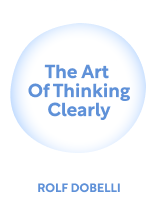

This article is an excerpt from the Shortform book guide to "The Art of Thinking Clearly" by Rolf Dobelli. Shortform has the world's best summaries and analyses of books you should be reading.
Like this article? Sign up for a free trial here .
Have you ever struggled to make a decision because there were too many options to choose from? How does having too many options impair decision-making?
Most people think that having more options to choose from is better than having fewer. However, having too many options can be just as bad as not having enough of them.
Here’s how having too many options causes paralysis of choice and impairs decision-making.
The Problem With Having Too Many Options
According to Rolf Dobelli, the author of The Art of Thinking Clearly, there are three key reasons why having too many options impairs decision-making:
1. Having too many options paralyzes you. A wide range of options makes you so afraid of choosing the wrong one that you avoid any decision, Dobelli says. (Shortform note: Some people tie this paralysis to loss aversion. The more options available, the more options you lose by choosing. You fear losing the other options more than you want to gain a single option by choosing, so you don’t choose.)
2. Having too many options lowers your standards. Lower standards make your decision easier by lessening the analysis needed for each choice, Dobelli adds. For example, if you’re overwhelmed by options for a new dishwasher, you won’t look for an affordable, quiet model that’s the right size with a good warranty. Instead, you’ll pick whichever one is the right size, regardless of other features.
(Shortform note: You make your choice easier by lowering your standards because you’re suffering from decision fatigue. Analyzing your options drains your willpower, leaving you without any willpower to make the final decision. Therefore, to make a decision, you dismiss your standards, focusing your remaining willpower on a single feature.)
3. Having too many options inspires uncertainty. After making your decision, you’ll be unhappy because you’ll never be sure it was the right choice, Dobelli says. With so many other options available, how do you know a different dishwasher wasn’t the better choice after all?
(Shortform note: This uncertainty stems from buyer’s remorse. You narrow your choice criteria, as discussed above, but you don’t forget about all the other options and features you’re sacrificing. You ignore those options to make your choice easier, but once you’ve made your decision, the knowledge of what you ignored returns, inspiring remorse and uncertainty.)
How can you avoid being overwhelmed by too many options? Dobelli suggests writing down the qualities that are important to you before evaluating your options. This stops you from becoming overwhelmed because it lets you immediately dismiss options that don’t fit your criteria.
(Shortform note: When writing down the qualities you want, be realistic about what you can actually gain. For example, if you can’t afford the dishwasher that meets all your criteria, then you can’t gain that dishwasher and need to broaden your scope. This mindset also applies when you’re making life-changing decisions. While “You can do anything” is a nice sentiment, it’s not actually true: What you can do is based on your past experience and skills. Thus, objectively evaluate your experience, skills, and options to focus on the options you can actually achieve. Doing so will ease decision anxiety and make you happier.)

———End of Preview———
Like what you just read? Read the rest of the world's best book summary and analysis of Rolf Dobelli's "The Art of Thinking Clearly" at Shortform .
Here's what you'll find in our full The Art of Thinking Clearly summary :
- A detailed look at the most common logical fallacies that inhibit decision-making
- How to recognize and overcome these fallacies to make better decisions
- Why you value things for arbitrary reasons






